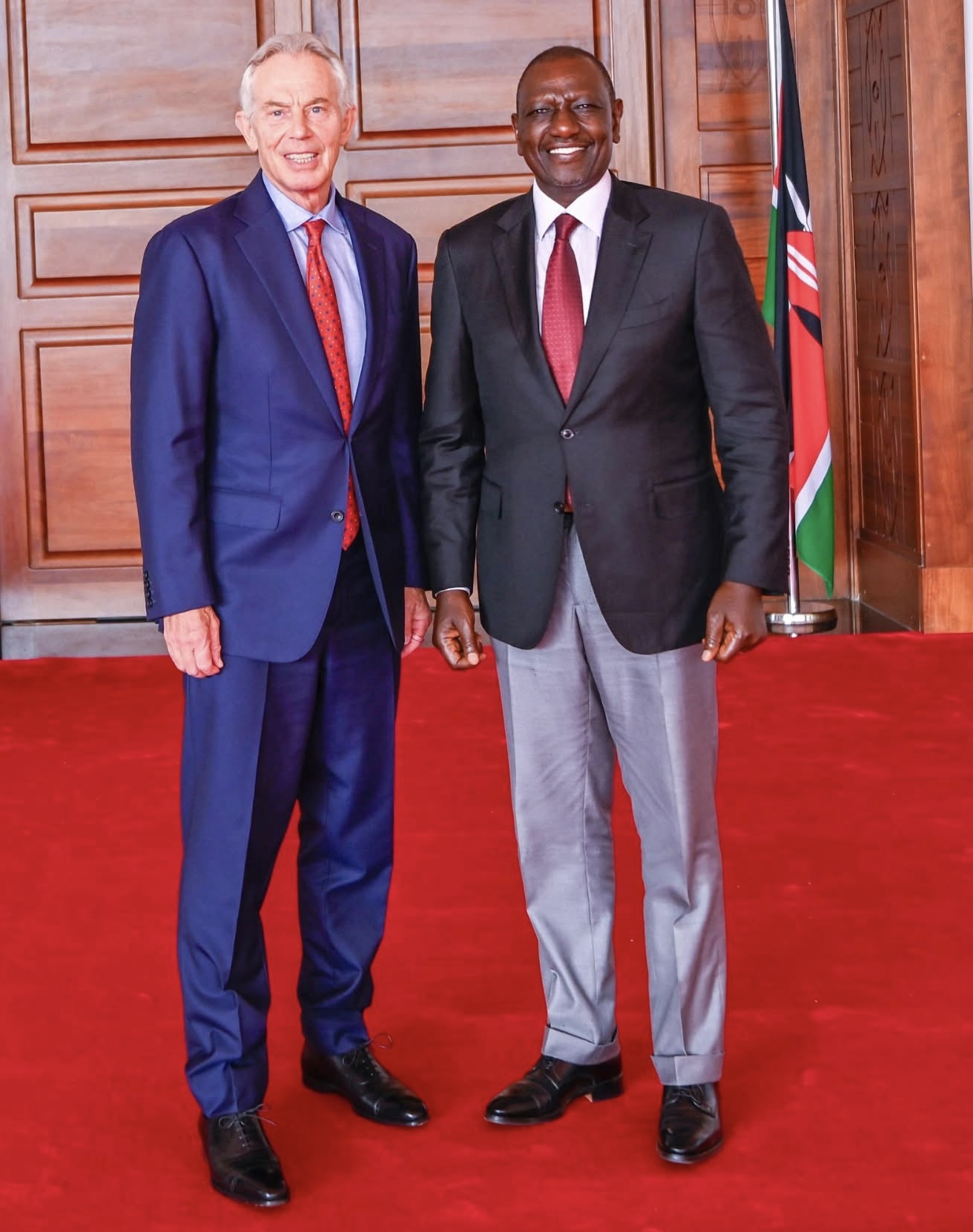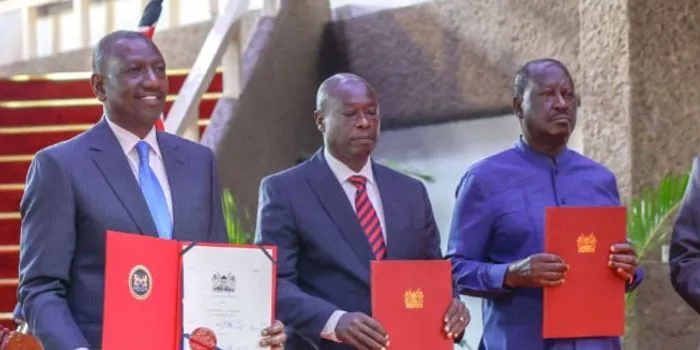Kenya teeters on the edge of a meticulously engineered crisis, where the political class, sensing their diminishing grip on power, manipulates social media to sow ethnic discord and lay the groundwork for post-election violence in 2027. Through platforms and like WhatsApp and X, they deploy a cadre of bloggers to amplify fictitious tribal rivalries, cloaking their schemes in a veneer of spontaneity to secure a seat at the negotiating table for yet another “broad-based” or “grand coalition” government. This is not mere politicking; it is a calculated prelude to violence, potentially escalating to ethnic cleansing.
The international community, particularly foreign backers like the British Government, must heed this urgent warning: Kenya’s 30 million citizens are weary of this corrupt establishment, and no amount of illegal weapons, trained militias, or fraudulent “kingpins” will suppress their demand for ideological transformation.
Under international law, the architects of this division are already culpable for crimes that demand accountability.
The Choreography of Conflict

Tribalists who perpetuate negative-ethnicity on social media. GABRIEL OGUDA, ROBERT ALAI, SETH ODONGO (DISEMBE) & GEORGE KALUMA
Since June 2024, when Kenyans united in unprecedented protests against punitive taxes, a resilient social cohesion has held firm, even in the most remote WhatsApp groups, which have resisted spiraling into hostility. Yet, a scripted online conflict has emerged, orchestrated by competing factions of bloggers aligned with political elites. On one side, bloggers like Kiprono Koech (@itskipronoh), Jim Njue (@jimNjue_), and Coletta Aluda (@Colettaaluda_1), aligned with former Deputy President Rigathi Gachagua, post inflammatory content designed to provoke emotionally vulnerable Kenyans. On the other, government-aligned influencers such as Gabriel Oguda (@gabrieloguda), Seth Odongo (@Disembe), Collince Onyango (@CollinceBey), George Peter Opondo Kaluma (@gpdkaluma), and Robert Alai (@RobertAlai) fuel ethnic undertones, particularly targeting the Kikuyu community, as seen during Gachagua’s impeachment in October 2024.
These posts, laden with divisive rhetoric, mirror the 2007-2008 post-election violence, where terms like “madoadoa” (blemishes) dehumanized Kikuyus, leading to over 1,000 deaths and 600,000 displacements.
This is no organic outpouring of grievance but a deliberate strategy to erode trust between communities. X posts reveal the playbook: Kiprono’s claim that Gachagua declared “vayolence” on “Mt. Kenya sellouts” and Oguda’s assertion that attacks on Kikuyus and Luos are “strategic” to sway Luo voters toward President William Samoei Ruto (@WilliamsRuto) expose a coordinated effort to inflame tensions.

Gachagua Bloggers Stoking Negative Ethnicity: Jim Njue, Cornelius Kipronoh and Colleta Aluda
By cherry-picking influencers with clout, these elites hyper-escalate non-existent Kikuyu-Luo rivalries, reviving the myth of the “tyranny of numbers” peddled by discredited intellectual Mutahi Ngunyi to falsely claim numerical dominance.
The Myth of Kingpins and the Machinery of Violence
The political class, aware of their waning legitimacy, fabricates ethnic kingpins to project influence they no longer wield. Rigathi Gachagua is no kingpin of Mount Kenya; his support hinges on a small network and the violent Mungiki gang, numbering fewer than 1,000. William Ruto, through allies like Oscar Kipchumba Sudi (@HonOscarSudi) and Farouk Kibet, is allegedly training fewer than 500 youths in the Rift Valley, some with military involvement, to perpetrate violence disguised as spontaneous unrest. Raila Odinga, once a towering figure in Luo Nyanza, now relies on goons from Kibera’s slums to maintain an illusion of control, unable to visit his base unscripted. These are not leaders with popular mandates but vigilante warlords, orchestrating chaos to usurp the will of Kenya’s 30 million voters, who increasingly reject the 2027 election as a solution and demand systemic overhaul.
This tripartite of violence – Mungiki, Rift Valley militias, and Kibera goons – lacks the scale to represent entire communities. Yet, the political elite, backed by foreign actors like the British Government, craft an illusion that violence is inevitable, requiring volatile social media rhetoric to legitimize their narrative.
The 2013 election saw similar tactics, with Cambridge Analytica profiling voters’ fears to manipulate outcomes, a strategy now refined through local bloggers. By framing unrest as tribal, these warlords shield themselves from international scrutiny, such as from the International Criminal Court (@IntlCrimCourt), while positioning themselves for post-election power-sharing deals, a tactic perfected in 2008’s coalition government.
The Prelude to Atrocity
The demonization of communities through orchestrated online spats is not merely divisive; it is a dangerous preamble to ethnic cleansing. By amplifying ethnic tensions, these actors exploit unsuspecting Kenyans, drawing them into narratives that fuel hatred and dehumanize groups. Historically, such “othering” has preceded atrocities, as seen in 2008 when Kikuyus were burned alive in a Kiambaa church, a tragedy linked to Kalenjin-led violence. Today’s rhetoric, with hashtags like #Madoadoa resurfacing, normalizes prejudice and erodes trust, creating fertile ground for violence. If you engaged in the online vitriol witnessed on Madaraka Day, you were likely co-opted into a broader agenda to destabilize Kenya’s social fabric, a manipulation that thrives on manufactured conflict.
International Complicity and Legal Culpability
The international community’s role, particularly the British Government’s support for Ruto’s regime, enables this dangerous game. By endorsing a narrative of inevitable violence, they facilitate the illusion that 2027 requires a crisis to resolve elite disputes, ignoring the Kenyan people’s demand for ideological competition.
Under international law, these actions constitute incitement to violence, prosecutable under Article 25(3)(e) of the Rome Statute, which holds individuals liable for soliciting or inducing crimes like genocide or ethnic cleansing. Article 7 further defines crimes against humanity, including persecution based on ethnic identity, a threshold met by the orchestrated demonization of Kikuyus and Luos. Ruto, Gachagua, and their allies, including Sudi and Kibet, are already culpable for these acts, as are bloggers who amplify their rhetoric.
The international community, with the United Kingdom’s High Commissioner Neil Wigan as its sanctimonious ringleader in Kenya, orchestrates a vile symphony of complicity that fertilizes the ground for war and ethnic cleansing worldwide. By laundering the ill-gotten gains of warlords through their pristine banking systems, they transform blood money into legitimate wealth, shielding despots like President William Ruto from accountability.

British High Commissioner to Kenya Neil Wigan is a staunch supporter of William Ruto’s policies of abductions, enforced disappearances, extrajudicial killings and suppression of dissent through trumped-up court cases
London’s financial hubs, awash with the proceeds of Kenya’s looted coffers, enable Ruto’s depravity, bankrolling militias and fueling ethnic tensions for potential bloodbath.
This isn’t oversight; it’s a deliberate hustle, with the UK’s sticky fingers deep in Kenya’s resources, from mineral-rich lands to cheap labor, all while Wigan’s diplomatic platitudes mask their greed.
The playbook for psychological operations, as evidenced by Tony Blair’s recent jaunt to Nairobi, is a masterclass in Western duplicity. Blair, the poster child for imperialist meddling, didn’t visit to uplift Kenya’s 57 million citizens, crushed under a KSh 11 trillion debt and 55% poverty rate; he came to coach Ruto’s regime in manipulating public sentiment, much like Cambridge Analytica’s fear-mongering in 2013.
The UK, through Wigan’s High Commission, provides the script: amplify tribal rivalries via bloggers, stoke unrest, and frame it as spontaneous to dodge international scrutiny. This psychological warfare, honed in London’s war rooms, ensures Kenya’s elites – Ruto, Raila Odinga, and their ilk – can orchestrate violence while Wigan sips tea, feigning ignorance, all to secure British access to Kenya’s human and natural resources for geopolitical leverage.

Prolific war-criminal and mass-murderer Tony Blair was in Nairobi last week to draw a blueprint for post-election violence fueled by his Cambridge Analytica exploits during the Uhuru Kenyatta regime
When mass atrocities erupt, as they did in Gaza with Israel’s Western-backed carnage, the UK and its allies offer diplomatic cover, shielding Kenyan warlords like Ruto from sanctions despite their incitement of ethnic hatred, prosecutable under Article 25(3)(e) of the Rome Statute. They arm these despots, turning a blind eye as Rift Valley militias train under Ruto’s allies, only to return 18 months later, crocodile tears in tow, pretending to rediscover their moral compass.
This hypocrisy isn’t accidental; it’s a colonial relic, with Wigan’s High Commission as the anchor of Ruto’s atrocities, ensuring Kenya remains a pliable pawn in the UK’s relentless pursuit of resources and influence that were never theirs to claim.
A Call for Resistance and Renewal
Kenyans are not pawns in this elite charade. The unity forged in June 2024, when Gen Z protests forced the government to retreat, underscores the power of collective action. The 35% poverty rate, 20% youth unemployment, and KSh 10 trillion public debt are not tribal issues but systemic failures demanding a new political paradigm. Kenyans must reject the divisive narratives peddled by bloggers and their masters, amplifying instead the authentic voices on TikTok and YouTube that expose systemic rot through intellect and awakening. The international community, particularly the ICC and foreign governments, must investigate and hold accountable those inciting violence, before Kenya descends into another post-election crisis.
The Kenyan people are fed up with fraudulent kingpins, illegal militias, and foreign-backed chaos. No amount of trained goons or social media manipulation will suppress their demand for a future built on ideas, not violence. The world must stand with Kenya’s citizens, not the warlords who seek to burn their nation for selfish ends. By fostering dialogue and rejecting hate, Kenyans can dismantle the foundation of division and build a nation that reflects their collective aspirations, not the ambitions of a corrupt few.

